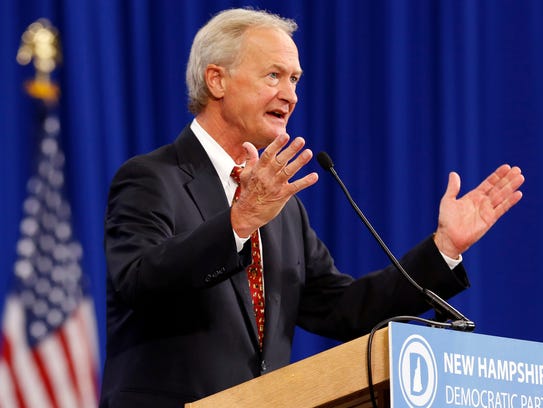
Strict Standards: Only variables should be assigned by reference in /home/noahjames7/public_html/modules/mod_flexi_customcode/tmpl/default.php on line 24
Strict Standards: Non-static method modFlexiCustomCode::parsePHPviaFile() should not be called statically in /home/noahjames7/public_html/modules/mod_flexi_customcode/tmpl/default.php on line 54
Strict Standards: Only variables should be assigned by reference in /home/noahjames7/public_html/components/com_grid/GridBuilder.php on line 29
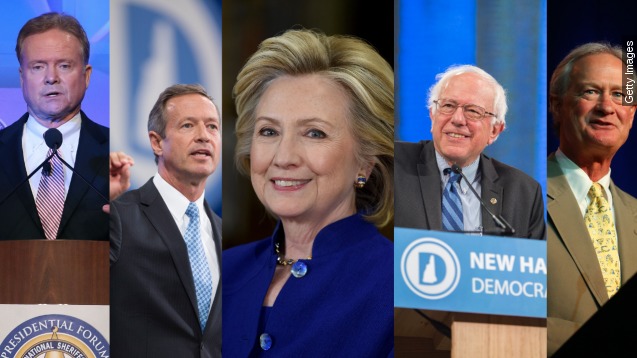
UP NEXT
03
Vice President Joe Biden hasn't said if he'll run for president, but if he decides by Tuesday, he will have a spot on the debate stage. Video provided by Newsy Newslook
The only participant at the first Democratic debate of the 2016 presidential campaign with nothing to prove is Sheryl Crow, the singer slated to open the evening by singing the National Anthem.
But for Hillary Clinton, Bernie Sanders, Martin O'Malley, Jim Webb and Lincoln Chafee, the stakes in Las Vegas Tuesday are going to be high. The two Republican debates held so far — boosting neurosurgeon Ben Carson and former CEO Carly Fiorina into top GOP ranks — have demonstrated the impact the nationally televised forums can have to shape and reshape voters' impressions.
Here's a quick look at what each of the Democratic candidates needs to do. The debate, sponsored by CNN and moderated by Anderson Cooper, starts at 8:30 PM ET.
'HELLO, I'M HILLARY'
Since Hillary Clinton formally announced her campaign in April, she's seen her poll standings fall and the controversy over her use of a private email server while secretary of State heat up. After a quarter-century in national politics, she no longer has a chance to make a first impression, but the debate does offer an opportunity for her to explain who she is and why she's running.
"Whatever her message has been, it's been drowned out by emails and servers and the opposition," Democratic strategist Joe Trippi, a veteran of past presidential campaigns, said in an interview. ""This is a real chance for her to lay it out."
What analysts don't expect her to do is attack challenger Bernie Sanders, whose supporters she will need if and when she wins the nomination. "Frankly, both Sanders and Clinton need to communicate warmth," says Democratic pollster Margie Omero. In contrast to the confrontational back-and-forth of the Republican debates, she says, "we may be able to determine the winner by looking at which candidate smiled the most."
That's not to say Clinton won't be attacked by others, on issues ranging from her 2002 vote in favor of the Iraq war to her reversal last week to oppose the Trans-Pacific Partnership. "She has to be prepared to answer the inevitable flip-flop question," says political scientist Dante Scala of the University of New Hampshire.
Strategists say Clinton, who has been on the defensive for months, needs to project an open manner. "This is really about her not having a shield up," Trippi says.
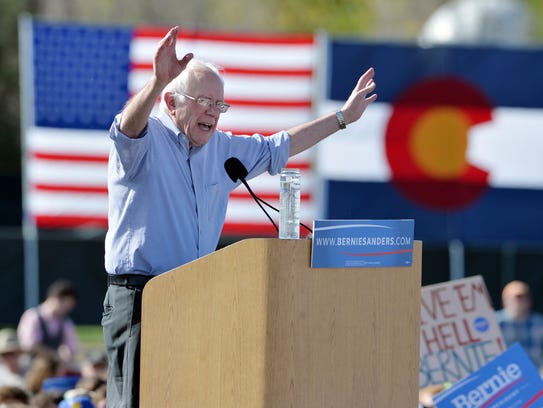
Sen. Bernie Sanders of Vermont at the University of Colorado in Boulder on Oct. 10 (Photo: David R. Jennings, AP)
A PLAUSIBLE PRESIDENT
Vermont Sen. Bernie Sanders arrives at the debate in a stronger position than even some of his top strategists initially thought possible. He has become a hero to progressive voters and the chief challenger to Clinton, and he is now drawing bigger crowds, more enthusiasm and nearly as much money as she is.
Expanding his appeal beyond his liberal base is his next task. "It's enough to get you 25%, 30% of the vote — and you're done," Trippi warns. "If you can't broaden to moderate blue-collar Democrats, Catholic Democrats, to African Americans and Hispanics, you can't win the nomination."
When the debate ends, success for Sanders would be "that Democratic primary voters find a Sanders presidency plausible," says Scala, co-author of The Four Faces of the Republican Party, being published by Palgrave Pivot next month. "It's one thing to be a prophet in the wilderness. It's another to be presidential. That's Sanders' challenge."
Sanders says his message espousing economic equity is one that resonates with many voters, including those who may not consider themselves particularly liberal. But the cost of his proposals are jaw-dropping. A Wall Street Journal analysis calculated it at $18 trillion in new government spending over the next decade.
"The big issue he'll need an answer for is on guns," Omero predicts. Sanders has opposed some proposals to limit access to guns, a record he argues reflects the sentiments of his constituents. The mostly rural Green Mountain State has one of the highest rates of gun ownership in the country.
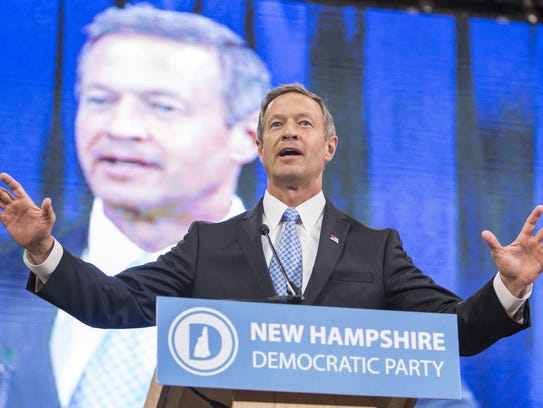
Martin O'Malley addresses the New Hampshire Democratic Party State Convention on Sept. 19 (Photo: Scott Eisen, Getty Images)
I'M STANDING RIGHT HERE
If Sanders arrives at the debate in a stronger position than expected, Martin O'Malley arrives in a weaker one. The former two-term governor of Maryland has campaigned hard but still barely registers in national polls. The RealClearPolitics average of recent surveys puts his support at less than 1%.
"For the first time, O'Malley is finally going to have an audience," Trippi says. O'Malley has been more willing than Sanders to go after Clinton on the email controversy and on her changes in position in recent weeks to oppose the Keystone XL Pipeline and the Pacific trade deal. O'Malley needs a breakthrough moment or an exchange during the debate that convinces Democratic voters to consider his candidacy.
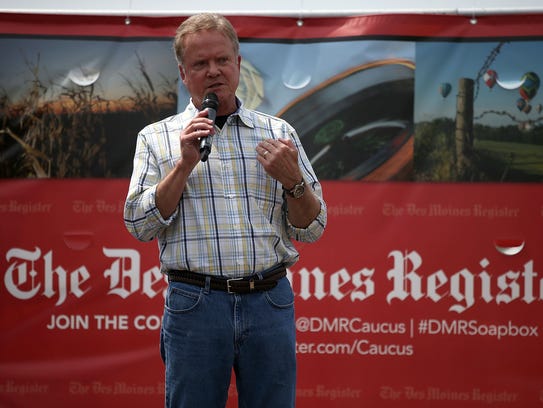
Jim Webb at the Iowa State Fair on Aug. 13 (Photo: Justin Sullivan, Getty Images)
REMEMBER IRAQ
Former Virginia senator Jim Webb has been running a low-profile, low-budget campaign. But his centrist views and his blunt manner gives him the potential to challenge the contenders seen as more likely Democratic nominees. He supports construction of the Keystone XL Pipeline, for instance, and argues that President Obama wasn't tough enough in the Iran negotiations. He also cites his opposition to the invasion of Iraq as a key selling point, which means he is likely to force Clinton to defend or at least discuss her 2002 vote to authorize the military action when she was a senator from New York. That was the main issue Barack Obama used in challenging Clinton in the 2008 primary campaign — which he won.
Lincoln Chafee at the New Hampshire Democratic convention on Sept. 19 (Photo: Jim Cole, AP)
RHODE ISLAND RESUME
Lincoln Chafee has the broadest political experience of anyone running for president in 2016. The Rhode Islander has served as a mayor, U.S. senator and governor, and he's run for office as a Republican, then an independent, and now as a Democrat. "He seems like a decent fellow," Trippi offers. That said, Chafee's resume hasn't made him a particularly serious contender. In the debate, he needs the same sort of breakthrough moment as O'Malley and Webb, but analysts say his reserved manner may make it harder for him.
Read or Share this story: http://usat.ly/1RCgZlB


UP NEXT
03
Vice President Joe Biden hasn't said if he'll run for president, but if he decides by Tuesday, he will have a spot on the debate stage. Video provided by Newsy Newslook
The only participant at the first Democratic debate of the 2016 presidential campaign with nothing to prove is Sheryl Crow, the singer slated to open the evening by singing the National Anthem.
But for Hillary Clinton, Bernie Sanders, Martin O'Malley, Jim Webb and Lincoln Chafee, the stakes in Las Vegas Tuesday are going to be high. The two Republican debates held so far — boosting neurosurgeon Ben Carson and former CEO Carly Fiorina into top GOP ranks — have demonstrated the impact the nationally televised forums can have to shape and reshape voters' impressions.
Here's a quick look at what each of the Democratic candidates needs to do. The debate, sponsored by CNN and moderated by Anderson Cooper, starts at 8:30 PM ET.
'HELLO, I'M HILLARY'
Since Hillary Clinton formally announced her campaign in April, she's seen her poll standings fall and the controversy over her use of a private email server while secretary of State heat up. After a quarter-century in national politics, she no longer has a chance to make a first impression, but the debate does offer an opportunity for her to explain who she is and why she's running.
"Whatever her message has been, it's been drowned out by emails and servers and the opposition," Democratic strategist Joe Trippi, a veteran of past presidential campaigns, said in an interview. ""This is a real chance for her to lay it out."
What analysts don't expect her to do is attack challenger Bernie Sanders, whose supporters she will need if and when she wins the nomination. "Frankly, both Sanders and Clinton need to communicate warmth," says Democratic pollster Margie Omero. In contrast to the confrontational back-and-forth of the Republican debates, she says, "we may be able to determine the winner by looking at which candidate smiled the most."
That's not to say Clinton won't be attacked by others, on issues ranging from her 2002 vote in favor of the Iraq war to her reversal last week to oppose the Trans-Pacific Partnership. "She has to be prepared to answer the inevitable flip-flop question," says political scientist Dante Scala of the University of New Hampshire.
Strategists say Clinton, who has been on the defensive for months, needs to project an open manner. "This is really about her not having a shield up," Trippi says.
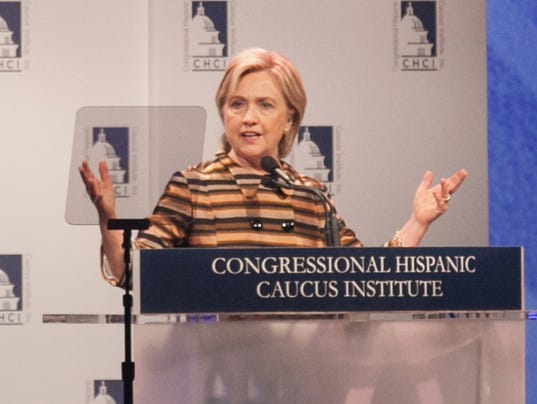
Sen. Bernie Sanders of Vermont at the University of Colorado in Boulder on Oct. 10 (Photo: David R. Jennings, AP)
A PLAUSIBLE PRESIDENT
Vermont Sen. Bernie Sanders arrives at the debate in a stronger position than even some of his top strategists initially thought possible. He has become a hero to progressive voters and the chief challenger to Clinton, and he is now drawing bigger crowds, more enthusiasm and nearly as much money as she is.
Expanding his appeal beyond his liberal base is his next task. "It's enough to get you 25%, 30% of the vote — and you're done," Trippi warns. "If you can't broaden to moderate blue-collar Democrats, Catholic Democrats, to African Americans and Hispanics, you can't win the nomination."
When the debate ends, success for Sanders would be "that Democratic primary voters find a Sanders presidency plausible," says Scala, co-author of The Four Faces of the Republican Party, being published by Palgrave Pivot next month. "It's one thing to be a prophet in the wilderness. It's another to be presidential. That's Sanders' challenge."
Sanders says his message espousing economic equity is one that resonates with many voters, including those who may not consider themselves particularly liberal. But the cost of his proposals are jaw-dropping. A Wall Street Journal analysis calculated it at $18 trillion in new government spending over the next decade.
"The big issue he'll need an answer for is on guns," Omero predicts. Sanders has opposed some proposals to limit access to guns, a record he argues reflects the sentiments of his constituents. The mostly rural Green Mountain State has one of the highest rates of gun ownership in the country.

Martin O'Malley addresses the New Hampshire Democratic Party State Convention on Sept. 19 (Photo: Scott Eisen, Getty Images)
I'M STANDING RIGHT HERE
If Sanders arrives at the debate in a stronger position than expected, Martin O'Malley arrives in a weaker one. The former two-term governor of Maryland has campaigned hard but still barely registers in national polls. The RealClearPolitics average of recent surveys puts his support at less than 1%.
"For the first time, O'Malley is finally going to have an audience," Trippi says. O'Malley has been more willing than Sanders to go after Clinton on the email controversy and on her changes in position in recent weeks to oppose the Keystone XL Pipeline and the Pacific trade deal. O'Malley needs a breakthrough moment or an exchange during the debate that convinces Democratic voters to consider his candidacy.
Jim Webb at the Iowa State Fair on Aug. 13 (Photo: Justin Sullivan, Getty Images)
REMEMBER IRAQ
Former Virginia senator Jim Webb has been running a low-profile, low-budget campaign. But his centrist views and his blunt manner gives him the potential to challenge the contenders seen as more likely Democratic nominees. He supports construction of the Keystone XL Pipeline, for instance, and argues that President Obama wasn't tough enough in the Iran negotiations. He also cites his opposition to the invasion of Iraq as a key selling point, which means he is likely to force Clinton to defend or at least discuss her 2002 vote to authorize the military action when she was a senator from New York. That was the main issue Barack Obama used in challenging Clinton in the 2008 primary campaign — which he won.

Lincoln Chafee at the New Hampshire Democratic convention on Sept. 19 (Photo: Jim Cole, AP)
RHODE ISLAND RESUME
Lincoln Chafee has the broadest political experience of anyone running for president in 2016. The Rhode Islander has served as a mayor, U.S. senator and governor, and he's run for office as a Republican, then an independent, and now as a Democrat. "He seems like a decent fellow," Trippi offers. That said, Chafee's resume hasn't made him a particularly serious contender. In the debate, he needs the same sort of breakthrough moment as O'Malley and Webb, but analysts say his reserved manner may make it harder for him.
Read or Share this story: http://usat.ly/1RCgZlB
Strict Standards: Only variables should be assigned by reference in /home/noahjames7/public_html/modules/mod_flexi_customcode/tmpl/default.php on line 24
Strict Standards: Non-static method modFlexiCustomCode::parsePHPviaFile() should not be called statically in /home/noahjames7/public_html/modules/mod_flexi_customcode/tmpl/default.php on line 54
Find out more by searching for it!
